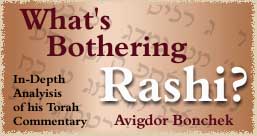

Back to this week's parsha | Previous Issues
Parashas Mishpatim
An exquisite example of a deceptively simple comment which makes us aware of an ovelooked difficulty in the verse. Exodus 22:20 You must not vex or oppress a stranger for you were strangers in the land of Egypt. For you were strangers. Rashi: If you vex him he can also vex you by saying "you too are descended from "gerim" "strangers." Do not reproach your fellow man about a fault which you also have. The term "ger" means a person who has not been born in that land (where he is presently living) but has come from another country to dwell there. What Is Rashi Saying Rashi seems to be spelling out in concrete terms what the verse itself says in more general terms. He also adds a psychological incentive to the commandment. Do not harass the stranger because you too are vulnerable and can, in turn, be harassed by him. Rashi then continues and gives the definition of the Hebrew word "ger." What would you ask of Rashi here? Your Question: Questioning Rashi A Question: At the end of his comment, Rashi defines the word ger. Does that seem strange to you? It should. The word ger is a very common word. It already occurs several times Genesis ( one example: Genesis 15:13) and it can even be found in the previous parasha, Yisro (Exodus 20:10). Rashi doesn't define the word, why, then, does he need to tell us its meaning here? This question flows from a basic assumption about Rashi's approach to commentary. Rashi would not define a familiar word unless there is a deeper problem forcing him to take the time to define the word here. What is that problem? Your Answer: What Is Bothering Rashi? To shrapen the question and your thinking, we ask: What kind of ger is referred to in this verse? Be aware that there are two types of gerim. 1) The ger toshav "the stranger-sojourner." He lives in the Land of Israel, but isn't Jewish. He observes the Seven Noachide laws, as any non-Jew is obligated to do. 2) The ger tzedek "The righteous convert." He is a convert to Judaism and is a full-fledged Jew. Which ger is referred to here? Your Answer: Understanding the Verse An Answer: The ger here is a convert. Rashi's comment is based on the midrash Mechilta and the Talmud Bava Metzia 59b. The Mechilta's words are the sharpest : "Don't say to him 'Until now swine's flesh was sticking out from between your teeth and now you dare to stand up and speak against me!' " So, it is clear that the verse is referring to a convert, who until recently ate swine. Now reread the verse and see if you understand it. What does it mean when it says: "for you were gerim (strangers) in Egypt" ? What kind of gerim ? Your Answer? Understanding Rashi An Answer: Certainly our forefathers weren't converts in Egypt. They were strangers in a strange land, in a word - foreigners. But there is a problem here. What is it? Your Question: A Deeper look A Question: If the Israelites were foreigners, and not converts, and if the stranger we are enjoined not to oppress is a convert and not a foreigner, what kind of comparison is there ? Of what relevance is the fact that "you were gerim in the land of Egypt" since we were a very different type of ger than the one being taunted? Understanding Rashi's Logic We now begin to understand Rashi's logic. He never defined the word ger before because ordinarily it doesn't require clarification. But in our verse there is likelihood of confusion. It is for this reason that Rashi defines the word at this point, and at this point only; telling us that the meaning of ger , is one who comes from another country. Rashi is aware, that the meaning of the word ger changes imperceptibly within the same verse, changing horses in mid-stream, so to speak. The Israelites were certainly not converts, and the taunted one is a convert. Therefore Rashi had to make it clear at this point, to avoid any confusion, what kind of gerim the Israelites were in Egypt. A Deeper Understanding But, if we are talking about two different gerim, we must understand how a comparison can be made between them. The relationship between the two types of strangers is explained in the Talmud, Bava Metzia 59b. There it says: one should not say to a person who has had someone in his family sentenced to death by hanging "your clothes are hanging on the line outside." Just the mere mention of the idea of "hanging" sends chills down his spine, so we too are reminded to be sensitive to this. Likewise here: The Torah is telling us to be sensitive to anyone who is a ger , because as long as your status is similar to his, even if in name only, then you too are vulnerable to his taunts and thus you, of all people, should be sensitive to his vulnerable position. The Lesson Rashi's internal reasoning may not always be apparent to us, but we can be assured that once we discover it, its logic will be convincing.
Back to this week's parsha | Previous Issues
|